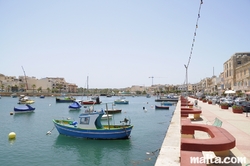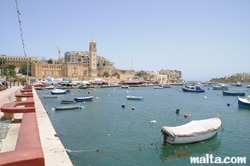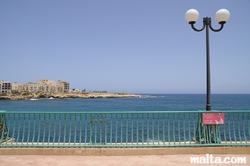Marsascala (Wied il-Ghajn)
Marsascala: a fishing village with a buzzing lifestyleMarsascala is an ancient fishing village in Malta, with a picturesque bay, located in the southeast corner of the island. The town has a population of 10,024 people and used to form part of Zabbar in the 19 century. The town has grown up around the sheltered bay, Marsascala Creek, and is protected by the headland of Ras il-Gżira to the south and by Ras iż-Żonqor, to the north. The town today stretches on both sides of the bay and Marsascala’s bay has a promenade continuing all the way to St Thomas Bay with views of low shelving rocks, colourful fishing boats and saltpans. In summer, the village is buzzing with life and many Maltese families have summer homes in this lovely, picturesque bay - the population rises to 20,000 in summer. Marsaskala has a range of modern leisure facilities, bars and restaurants. It is much debated where Marsaskala got its name. Marsa is an Arabic word for “bay”; however Skala might have been derived from the Italian word for Sqalli meaning “Sicilian”. Sicilian fishermen are indeed often stayed in Marsascala as it is only 60 miles south of Sicily. The Maltese often refer to Marsaskala as Wied il-Għajn, Wied meaning valley and Ghajn refers to the spring of fresh water (Valley of the fresh Spring). This reference is due to the old towns location between two valets in which springs of fresh water used to flow down into the deepest part of the bay. Marsascala's interesting historyMarsascala was inhabited thousands of years ago according to various remains found in the area. Roman era villas, Roman Baths, as well as early Christian catacombs found in the town suggest that Marsaskala once was a Roman port. The parallel channels formed in the rock face called cart-ruts, and they are certainly some of the oldest remains. Some of them unexplainably lead straight into the sea. It is still not sure how they were made or what was their purpose. During the time of the Knights in 1614 a 60-strong fleet of Turkish ships carrying around 600 solders made a surprise attack on Marsascala. However the Maltese gave them a hard battle, and finally drove the Turkish soldiers away. After this attack fear, and memories of the 1565 Great Siege of Malta was brought back, and Grandmaster Alof de Wignacourt decided that improved fortifications were necessary in this sensitive area. In the same year St Thomas tower was build and finished by the Knights of St John. The huge fortress takes its name from St Thomas Church nearby. Marsascala: Things to do and seeSt. Thomas Bay: This bay provides an ideal spot for swimming and sunbathing. St Thomas Tower: Grandmaster Alof de Wignacourt began building Fort St Thomas in the exact location where the enemy had landed in 1614, on a plot of land bought previously by the same Grandmaster Mamo Tower: A few years later, in 1657, the Mamo family built Mamo Tower at Tar-Rumi, on the road leading to Zejtun. It is not as big and as strong as St Thomas; it is built on a plan of St Andrew's cross and has a small dry moat around it also had a drawbridge in the past. Tal-Buttar Tower: Tal-Buttar is a private tower, today used as a farmhouse, which lies in a valley close to another private tower - Tal-Gardiel. It used to have a flight of stairs coming to a sudden end, as this tower had a drawbridge. De Redin Tower (Zonqor): This tower was built by Grand Master de Redin in 1659. The Grandmaster ordered the building of a number of such towers around the Maltese coast and they still bear his name. One of those towers still exists, built on the coast at the exact point separating the limits of Marsaskala from those of Zabbar. Briconet Redoubt: This redoubt near the Marsaskala’s parish church is one of the best-preserved redoubts of the Maltese islands. It was built by the Commendatore Gio in 1715 at the expense of 768 skudi. Salt Pans: Looking down from the promenade onto the shoreline one will discover the beautiful saltpan system, still being used today. |
South-Malta
Marsascala, Malta
Website
Population : 10024
Local council :
228, Salini Street, Marsascala MSK 3012,Phone: +356 2163 7171 Bus number : 91, 119, 124, 135, 204, N91 |



























Post your comment
Please login or register in order to write a comment
Comments of Members
No comments yet.